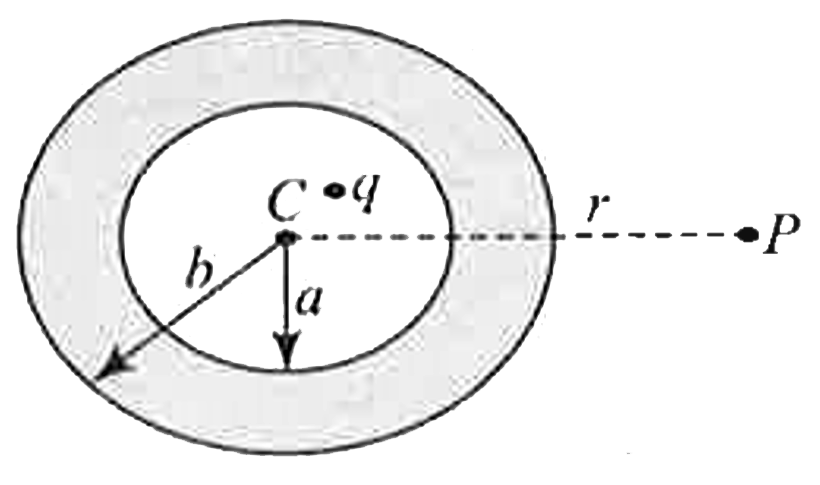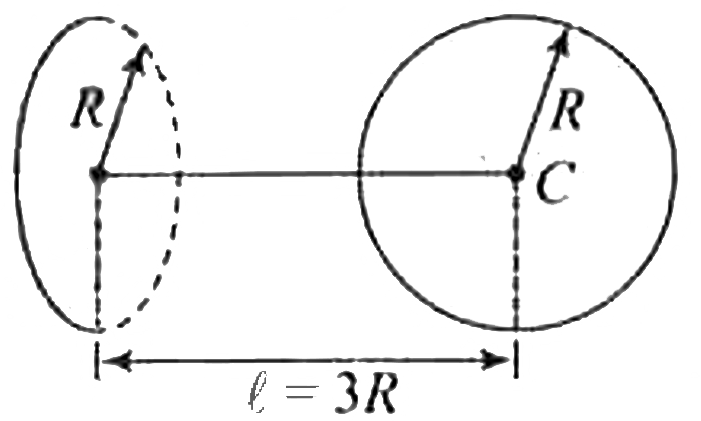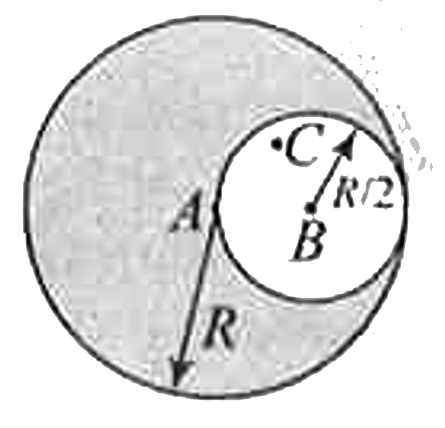Complete Solutions to DPP 3.5 of chapter ELECTRIC POTENTIAL of Class 12 book with complete answers and questions
| Class 12 | PHYSICS |
| Chapter | ELECTRIC POTENTIAL |
| CENGAGE PHYSICS DPP | DPP 3.5 |
| Number Of Questions | 15 |
| Academic Year | 2023-24 |
In the figure shown a conducting sphere of inner radius 'a' and outer radius 'b' is given a charge `Q`. A point charge 'q' is placed in the cavity of this sphere at distance `'x' (lt a)` away from the centre. Find the electric field intensity and electric potentials at point `P` (outside the sphere) at distance `r gt b`. Also find the electric potential at point C

View SolutionA point charge Q is situated (outside) at a distance r from the centre of an uncharged conducting solid sphere of radius R. The potential due to induced charges (on the conductor) at a point B inside the conductor whose distance form the point charge is d is ______
View SolutionFind the electric field potentail and strength at the centre of a hemisphere fo raidus `R` ahcged uniformly with the the surface density `sigma`.
View SolutionThere are three concentric conducting spherical shells. All of them are charged. The innermost sphere is connected by a conducting wire to the outermost sphere. Prove that the final charge on the innermost sphere is independent of the initial charge of outermost sphere.
View SolutionBoth the ring and the conducting sphere are given the same charge `Q`. Determine the potential of the sphere. Assume that the centre of the sphere lies on the axis of th ring. Is it necessary that the charge on the ring be uniformly distributed to answer the above question ?

View SolutionA solid sphere of radius 'R' has a cavity of radius `(R)/(2)`. The solid part has a uniform charge density `'rho'` and cavity has no charge. Find the electric potential at point 'A'. Also find the electric field (only magnetude) at point 'C' inside the cavity

View SolutionA thibn spherical conducting shell of radius R has a charge q. Another charge `Q` is placed at the centr of the shell. The electrostatic potential at a point P a distance R/2 from the centre of the shell is
View SolutionAn arc of radius r carries charge. The linear density of charge is `lamda` and the arc subtends an angle `(pi)/(3)` at the centre.
View SolutionTwo identical thin rings, each of radius R, are coaxially placed at a distance R. If `Q_(1) and Q_(2)` are respectively, the charges uniformly spread on the two rings, find the work done in moving a charge q from centre of ring having charge `Q_(1)` to the other ring.
View SolutionIf the electric potential of the inner metal shell is 10 V and that of the outer shell is 5 V, then the potential at the centre will be

View SolutionPotential difference beween centre and surface of the sphere of radius R and uniorm volume charge density `rho` within it will be
View SolutionA mercury drop has potential 'V' on its surface. 1000 such drops combine to form a new drop. Find the potential on the surface of the new drop.
View SolutionA solid conducting sphere of radius 'a' is surrounded by a thin uncharged concentric conducting shell of radius `2a`. A point charge q is placed at a distance `4a` from common centre of conducting sphere and shell. The inner sphere is then grounded
The charge on solid sphere is
View SolutionA solid conducting sphere of radius 'a' is surrounded by a thin uncharged concentric conducting shell of radius `2a`. A point charge q is placed at a distance `4a` from common centre of conducting sphere and shell. The inner sphere is then grounded
Pick up the correct statement.
View SolutionA solid conducting sphere of radius 'a' is surrounded by a thin uncharged concentric conducting shell of radius `2a`. A point charge q is placed at a distance `4a` from common centre of conducting sphere and shell. The inner sphere is then grounded
The potential of outer shell is
View Solution
DPP 3.5 questions and complete solutions for chapter ELECTRIC POTENTIAL of CENGAGE PHYSICS (ENGLISH) of Class 12